 Petzlover
Petzlover Bull Terrier Miniature is originated from United Kingdom but Spitz is originated from Russia. Bull Terrier Miniature may grow 37 cm / 14 inches shorter than Spitz. Bull Terrier Miniature may weigh 25 kg / 55 pounds lesser than Spitz. Both Bull Terrier Miniature and Spitz has almost same life span. Bull Terrier Miniature may have less litter size than Spitz. Bull Terrier Miniature requires Low Maintenance. But Spitz requires Moderate Maintenance
Bull Terrier Miniature is originated from United Kingdom but Spitz is originated from Russia. Bull Terrier Miniature may grow 37 cm / 14 inches shorter than Spitz. Bull Terrier Miniature may weigh 25 kg / 55 pounds lesser than Spitz. Both Bull Terrier Miniature and Spitz has almost same life span. Bull Terrier Miniature may have less litter size than Spitz. Bull Terrier Miniature requires Low Maintenance. But Spitz requires Moderate Maintenance
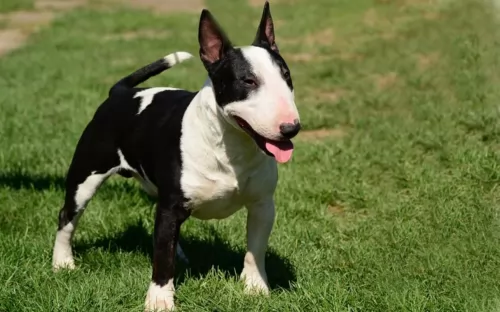 Less well known than the Bull Terrier, the Miniature Bull Terrier which actually follows the same breed standard, has a height of 35cm. The Bull Terrier and Miniature are classified as the same breed. The weight of the smaller Miniature is only about 15kg.
Less well known than the Bull Terrier, the Miniature Bull Terrier which actually follows the same breed standard, has a height of 35cm. The Bull Terrier and Miniature are classified as the same breed. The weight of the smaller Miniature is only about 15kg.
It was in the early 1800s that the Miniature Bull Terrier was developed, descending from the English Bulldog as well as the White English Terrier which is now extinct. This blend produced the Bull and Terrier, which was later shortened to the Bull Terrier. They came in a number of colors such as pure white, white and tan as well as white-and-black-patched or tri-colored.
Breed fanciers wanted a compact dog which looked much the same as the larger Bull Terrier. It was in 1938 that Colonel Glyn founded the Miniature Bull Terrier Club in England and the Miniature Bull Terrier Club of America was formed in 1966.
 A spitz is not a breed of dog, but rather a “group or family” of dogs that has its roots in Germany. Within this family there are a variety of breeds that were bred for very specific purposes by people in many different parts of the world. The spitz family can be toy dog size up to vey large. Examples run from the Pomeranian to the Canadian Eskimo Dog.
A spitz is not a breed of dog, but rather a “group or family” of dogs that has its roots in Germany. Within this family there are a variety of breeds that were bred for very specific purposes by people in many different parts of the world. The spitz family can be toy dog size up to vey large. Examples run from the Pomeranian to the Canadian Eskimo Dog.
The Spitz family dogs share the look of thick, long fur and pointed muzzles, ears and curly tail. Despite their German name, they are thought to originally be of East Asia or Artic descent. Most of today’s spitz are from Siberia’s Artic region, first described in 1788 and in English in 1792. Spitz have been bred for three types of jobs depending upon where they were developed. These jobs included pulling, herding and hunting.
There are very powerful and large Spitz breeds that pull or hunt large game. Examples of these breeds are the Swedish Elkhound, the Akita Inu, the Norwegian Elkhound and the Karelian Bear Dog. The smaller sized breeds like the Samoyed hunted small mammals and birds, while the Finnish Lapphund, Lapponian Herder, and Swedish Lapphund herded, hunted and pulled small sleds.
The three largest spitz also pulled sleds throughout the 17th and 18th centuries. In most places the Canadian Eskimo Dog, the Alakan Malamute and the Greenland dog were used in sled racing and fur trapping while in Canada and Alaska the Siberian Husky was used for the same things.
Recently there have been genetic tests that show a large number of dogs that are considered Spitz type so share many strong ancestral ties and DNA similarities with wild wolves. It is now believed that a lot of these breeds were intentionally mated with wolves and some were accidental. Both domestic and wild dogs are included in this history.
Most spitz are made for cold weather, even today’s lapdogs, like the Pomeranian, do not do well in hot climates.
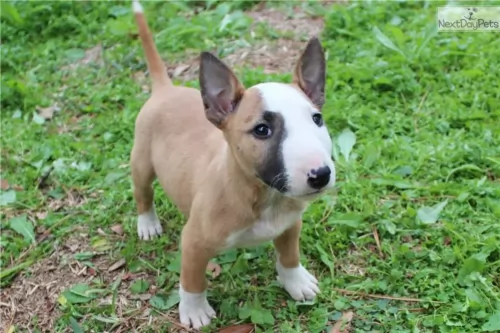 Miniature Bull Terriers, just like the regular Bull Terriers have short, glossy coats and these coats can be white, tan, brindle or tri-color such as black, tan and white. This is a muscular little dog, with the same very distinctive egg-shaped head and small, closely-set dark eyes and erect ears. The medium length tail is carried horizontally.
Miniature Bull Terriers, just like the regular Bull Terriers have short, glossy coats and these coats can be white, tan, brindle or tri-color such as black, tan and white. This is a muscular little dog, with the same very distinctive egg-shaped head and small, closely-set dark eyes and erect ears. The medium length tail is carried horizontally.
The Miniature Bull Terrier isn’t particularly good with small children, but he still makes a good companion for people, whether he lives in the city or the country. In fact, this smaller breed Bull Terrier makes a great pet for people with smaller spaces, and like the Bull Terrier, he is a loving, devoted pet. He has an entertaining personality, is playful and energetic, making him a good watch dog.
However, even though he is small, he is always more than ready to take on any larger pets and therefore isn’t considered the greatest pet to have if you have other animals in the house. However, with excellent training and socialization, this handicap can be overcome.
 Most of the spitz breeds share a “look” that includes erect ears, stocky heavy, usually double coats, a pointed muzzle, thick, fluffy ruffs and a heavy curled tail carried high over the body. Build for northern climates they are insulated by a undercoat that is waterproof and dense and a less dense topcoat. Their ears are small to prevent frostbite and their paws have thick fur to protect them in the frigid, icy terrain.
Most of the spitz breeds share a “look” that includes erect ears, stocky heavy, usually double coats, a pointed muzzle, thick, fluffy ruffs and a heavy curled tail carried high over the body. Build for northern climates they are insulated by a undercoat that is waterproof and dense and a less dense topcoat. Their ears are small to prevent frostbite and their paws have thick fur to protect them in the frigid, icy terrain.
Many still have wolf-like looks and tendencies. Some are very difficult to train to be companions – the Akita, Chow and especially the Karelian Bear Dog – fall into this category. Many mixed breed dogs are also considered members of the Spitz family. These dogs are easy to recognize as spitz because of these physical characteristics
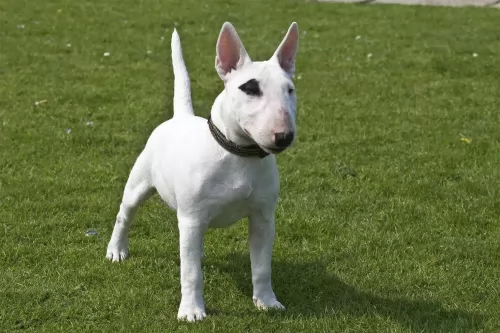 The attractive Miniature Bull Terrier is just a small version of the regular Bull Terrier, and many people are drawn to them because they have all the spunk of the larger breed but are easier to manage. He is such an entertaining little dog and guarantees to make an excellent family companion. He is just longing to be involved in every family activity happening around him.
The attractive Miniature Bull Terrier is just a small version of the regular Bull Terrier, and many people are drawn to them because they have all the spunk of the larger breed but are easier to manage. He is such an entertaining little dog and guarantees to make an excellent family companion. He is just longing to be involved in every family activity happening around him.
He becomes attached to his human family, but this deep bond between him and his family can lead to separation anxiety. Never leave him alone day after day in the backyard. You wouldn’t to that to one of your children, and he is a family member, albeit a 4-legged one.
Just like the standard Bull Terrier, the Miniature Bull Terrier is going to need firm training from a young age. Then he becomes an exceptional pet as he understand the boundaries in your particular home.
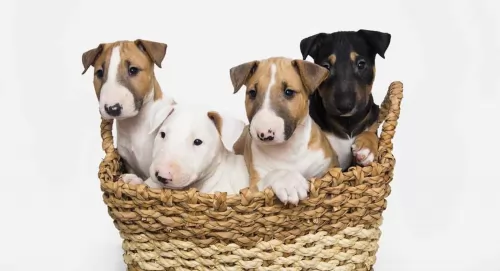 The Miniature Bull Terrier can live to be 10 to 12 years of age. Their most serious health issue is blindness which is caused by lens dislocation, showing up more or less after 3 years of age. With the white dogs, other breed health concerns can include congenital deafness and compulsive tail chasing.
The Miniature Bull Terrier can live to be 10 to 12 years of age. Their most serious health issue is blindness which is caused by lens dislocation, showing up more or less after 3 years of age. With the white dogs, other breed health concerns can include congenital deafness and compulsive tail chasing.
Some Bull Terriers develop a compulsive neurologic disorder where the dog turns round and round chasing his tail. As soon as you see this, try and distract him with an exciting game, because allowed to develop, it’s a habit that can become difficult to control.
This is a common problem with dogs and you need to watch that tartar build-up on the teeth which can lead to infection of the gums. Brush your pet’s teeth with special dog toothpaste and toothbrush 2 or 3 times a week so that he doesn’t lose any teeth. Bad teeth can affect other organs such as the kidneys and heart.
 It is a little harder to characterize the health issues of a family of dogs than it is a .will overheat in hot climates due to their double coats. Here are some propensities of dogs in the Spitz family.
It is a little harder to characterize the health issues of a family of dogs than it is a .will overheat in hot climates due to their double coats. Here are some propensities of dogs in the Spitz family.
• Thrombopathia bleeding disorder with the risk of a hemorrhage, platets don’t clot.
• Larger breeds are affected by Elbow and Hip dysplasia that can cause arthritis and lameness.
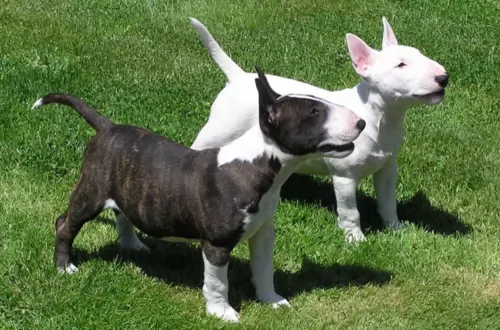 With his short, smooth coat, the Miniature Bull Terriers requires little grooming. He’ll need a good brush down twice a week to remove loose hairs.
With his short, smooth coat, the Miniature Bull Terriers requires little grooming. He’ll need a good brush down twice a week to remove loose hairs.
This is one of the best things you can do for your Bull Terrier if you don’t want them having puppies. Spaying or neutering decreases the likelihood of certain types of cancers too.
Keep your dog’s diet consistent, varying between a top quality commercial produced dog food appropriate to his age. You can include home-made meat, vegetables and rice and some raw meat every now and then. Never feed him human-food such as peanuts, crisps and chocolate. Always have fresh, cool water available night and day.
 1Feeding the puppy The Spitz family has high energy needs but in a slow-release so they need protein more than grain. Puppies should be fed 3-4x a day in small meals. Don’t overfeed them.
1Feeding the puppy The Spitz family has high energy needs but in a slow-release so they need protein more than grain. Puppies should be fed 3-4x a day in small meals. Don’t overfeed them.
2.Feeding the adult – The Spitz type dog stores their energy to use in extended periods when working or playing. They will become obese if overfed or if they don’t get enough exercise. Feed 2-3X a day in small or medium sized meals, even the larger breeds because of their storage of calories.
4. Games and Exercises – Having been bred for endurance and stamina most Spritz breed need plenty of exercise, lots of space and lots of play. They love to run, jog, or play games. They are outdoors types who love to hike, and run or walk for long times over long distances. They are great in cold, wet weather but not so good in the heat. How much exercise they need depends on the size and history of the specific breeds. Most love to play with other dogs, so dog parks and dog day care can both be good choices for most of them. Agility, barnhunt, field trials, pulling games are all good choices.